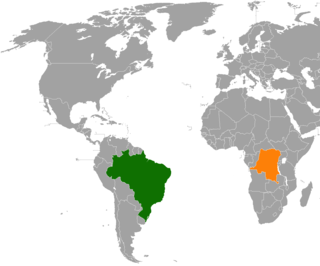
The foreign relations of Angola are based on Angola's strong support of U.S. foreign policy as the Angolan economy is dependent on U.S. foreign aid. From 1975 to 1989, Angola was aligned with the Eastern bloc, in particular the Soviet Union, Libya, and Cuba. Since then, it has focused on improving relationships with Western countries, cultivating links with other Portuguese-speaking countries, and asserting its own national interests in Central Africa through military and diplomatic intervention. In 1993, it established formal diplomatic relations with the United States. It has entered the Southern African Development Community as a vehicle for improving ties with its largely Anglophone neighbors to the south. Zimbabwe and Namibia joined Angola in its military intervention in the Democratic Republic of the Congo, where Angolan troops remain in support of the Joseph Kabila government. It also has intervened in the Republic of the Congo (Brazzaville) in support of Denis Sassou-Nguesso in the civil war.

For the two decades preceding the Republic of the Congo's 1991 National Conference, the country was firmly in the socialist camp, allied principally with the Soviet Union and other Eastern bloc nations. Educational, economic, and foreign aid links between Congo and its Eastern bloc allies were extensive, with the Congolese military and security forces receiving significant Soviet, East German, and Cuban assistance.

Tanzania's first president, Julius Nyerere also was one of the founding members of the Non-Aligned Movement, and, during the Cold War era, Tanzania played an important role in regional and international organisations, such as the Non-Aligned Movement, the front-line states, the G-77, and the Organisation of African Unity (OAU). One of Africa's best-known elder statesmen, Nyerere was personally active in many of these organisations, and served chairman of the OAU (1984–85) and chairman of six front-line states concerned with eliminating apartheid in Southern Africa. Nyerere was also involved with peace negotiations in Burundi until his death. Nyerere's death, on 14 October 1999, is still commemorated annually.

After independence in 1964 the foreign relations of Zambia were mostly focused on supporting liberation movements in other countries in Southern Africa, such as the African National Congress and SWAPO. During the Cold War Zambia was a member of the Non-Aligned Movement.

Democratic Republic of the Congo–United States relations are the international relations between the Democratic Republic of the Congo and the United States of America.

Democratic Republic of the Congo–Russia relations are the bilateral foreign relations between the Democratic Republic of the Congo and Russia. The Democratic Republic of the Congo has an embassy in Moscow and an honorary consulate in Yekaterinburg. Russia has an embassy in Kinshasa. The relations between the two countries were established on July 7, 1960, and restored since November 30, 1967.

Roger Allen Meece is an American diplomat. He has served as United States ambassador to Malawi (2000–2003) and Democratic Republic of the Congo (2004–2007), as well as Charge d'affairs to Nigeria (2003) and to Ethiopia (2009). His last diplomatic appointment was as head the United Nations mission (MONUSCO) in the Democratic Republic of Congo from 2010–2013. After this appointment, Meece retired from diplomatic positions.

Its location in the center of Africa has made the Democratic Republic of the Congo a key player in the region since independence. Because of its size, mineral wealth, and strategic location, Zaire was able to capitalize on Cold War tensions to garner support from the West. In the early 1990s, however, with the end of the Cold War and in the face of growing evidence of human rights abuses, Western support waned as pressure for internal reform increased.

Brazil–Democratic Republic of the Congo relations are the current and historical relations between the Federative Republic of Brazil and the Democratic Republic of the Congo. Both nations are members of the Group of 24, Group of 77 and the United Nations.

Democratic Republic of the Congo–India relations are the international relations that exist between the Democratic Republic of the Congo (DRC) and India.

Democratic Republic of the Congo–Holy See relations refers to the current relationship between the Democratic Republic of the Congo and the Holy See. The two states have seen an increase in their cooperation in recent years, and due to the large number of Roman Catholics in the DRC, President Joseph Kabila has made an effort to maintain good relations with the Vatican.

Democratic Republic of the Congo–Spain relations are the bilateral relations between the Democratic Republic of the Congo (DRC) and Spain. The Democratic Republic of the Congo has an embassy in Madrid. Spain has an embassy in Kinshasa.

Democratic Republic of the Congo–Turkey relations are the bilateral relations between the Democratic Republic of the Congo and Turkey. Turkey has an embassy in Kinshasa since 1974, and the DR Congo opened its embassy in Ankara in 2011.
Democratic Republic of the Congo- Italy relations are the current and historical foreign and trade relations between Democratic Republic of the Congo and Italy.

Democratic Republic of the Congo–Germany relations are primarily characterized by the development aid that Germany provides in the DR Congo. Germany is one of the most important donor countries to the DR Congo.















